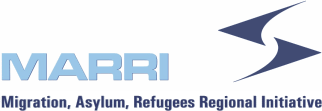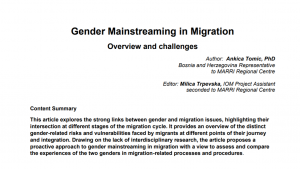 Power relations, gender norms and unequal rights shape the migration choices and experiences of women and men. Gender therefore needs to be considered in all aspects when it comes to migration and forced displacement.
Power relations, gender norms and unequal rights shape the migration choices and experiences of women and men. Gender therefore needs to be considered in all aspects when it comes to migration and forced displacement.
To shed some light on the topic, Swiss Agency for Development and Cooperation (SDC) Network on Migration and Gender called for contributions of articles and resources to be published in the online dossier on migration and gender.
On behalf of MARRI RC, Dr. Ankica Tomic and Ms. Milica Trpevska contributed the article Gender Mainstreaming in Migration.
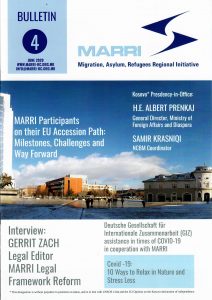
Dear colleagues,
My foreword to the fourth edition of our Bulletin is dedicated to all those who enable our work from home in times of pandemic.
I start with our dear families. When the video-conferences start, family members take babies to the park, partners turn down web pages, and take children outdoor, mobile phones are switched off, games stopped, doors and windows get closed to keep the traffic noise outside, dogs receive a bone to chew on, cats a bowl of milk – just to keep them all quiet. Because our video-conferences start.
MARRI Bulletin 4
Every first week of April, MARRI RC organizes MARRI Friends Meeting – a traditional presentation of annual results and future plans of MARRI to the Diplomatic Corps, MARRI’s partners, donors, representatives of governmental institutions and civil society sector in North Macedonia. The event also provides opportunity for the stakeholders to discuss the possibilities for joint efforts in the area of migration management in the Western Balkans.
Unfortunately, due to the COVID-19 epidemic, the MARRI Friends Meeting 2020 was canceled and the MARRI Diplomatic Briefing was published instead.
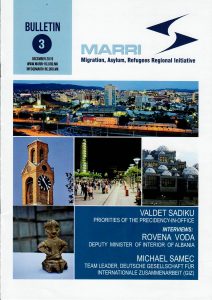
If you call it “Ahead of the game” (Australian Government) or “Fit for purpose” (UN, OSCE), it does not matter. A changing world and the 2030 SDG Agenda require many institutions and organizations to adapt to the 21st century’s challenges and transformation.
MARRI Bulletin 3
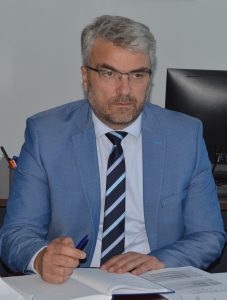 “About 70% of the migrants passing through the Balkan region are adult men” said MARRI RC Director Sashko Kocev in the interview for Faktor.
“About 70% of the migrants passing through the Balkan region are adult men” said MARRI RC Director Sashko Kocev in the interview for Faktor.
Interview
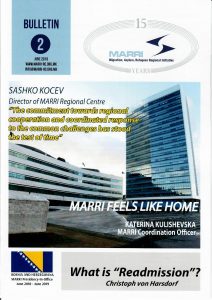 Dear MARRI partners, supporters and friends,
Dear MARRI partners, supporters and friends,
This year, we are proud to mark the 15th anniversary of MARRI as a catalyst for regional cooperation on issues concerning migration, asylum and refugees in the Western Balkans. Back in 2004, MARRI was established with a decision by the Stability Pact of South-Eastern Europe. It has since evolved from a donor-supported organisation to a regional initiative jointly owned by its Participants.
Looking back, I am amazed by the hard work done and the progress made during this challenging but rewarding period. In 2008, the Participants took over the full ownership and leadership of MARRI, while securing its sustainability by funding the running costs for its Secretariat – the MARRI Regional Centre.
Initially, MARRI has been established by Albania, Bosnia and Herzegovina, Croatia, (North) Macedonia, and Serbia and Montenegro. Over the years, its composition has changed with the leaving of Croatia and joining of Kosovo* as a full-fledged MARRI Participant. Nevertheless, the commitment towards regional cooperation and a coordinated response to the common challenges has stood the test of time.
MARRI Bulletin 2
*This designation is without prejudice to positions on status, and is in line with UNSCR 1244/1999 and the ICJ Opinion on the Kosovo declaration of independence
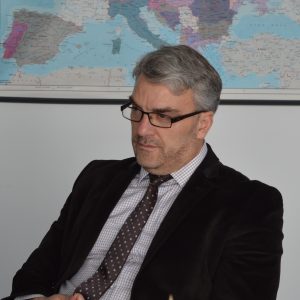 “Far more economic migrants pass through the Western Balkans than refugees from the war zones” said MARRI RC Director Sashko Kocev in the interview for Ina Online.
“Far more economic migrants pass through the Western Balkans than refugees from the war zones” said MARRI RC Director Sashko Kocev in the interview for Ina Online.
Interview
 Power relations, gender norms and unequal rights shape the migration choices and experiences of women and men. Gender therefore needs to be considered in all aspects when it comes to migration and forced displacement.
Power relations, gender norms and unequal rights shape the migration choices and experiences of women and men. Gender therefore needs to be considered in all aspects when it comes to migration and forced displacement.